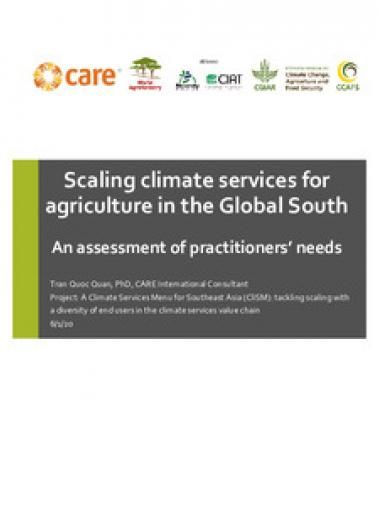Scaling climate services for agriculture in the Global South: an assessment of practitioners’ needs

Several CS projects have been implemented recently to meet the increasing demand from farmers and other decision makers in the Global South for climate information and agro-advisories. This has led to two main concerns: (1) how CS products and services can be improved for the benefit of small-scale farmers at different scales; and (2) how to sustain (successful) CS projects beyond the end their lifetime. Addressing these two questions will require pathways for scaling CS projects. Hence, 20 CS projects across Asia, Africa and Latin America were reviewed through a mix of desk research and interviews (both virtual and face-to-face) with project practitioners to solicit their views of and experiences with CS projects, the provided services and products, and scaling. Results showed that the CS sector has clearly matured in recent decades. CS providers focus mainly on translation and transfer of climate date, and rely on observational data and climate and hydrological models, from national, international and private sources. There is great diversity of products in terms of format, content, way of communication, frequency, and target groups, which shows the potential to tailor CS products and their messages to the specific needs of end-users and diverse contexts. The design and implementation of CS depends on a myriad of actors working together along the CS value chain. For historical reasons many of the selected projects in the South were coordinated and/or funded by NGOs, but increasingly government agencies and/or private sector have become active partners as well. Despite these positive developments, one of the main challenges of scaling CS comes from the collaboration between different institutions. Whereas different organizations may agree on the common goals, they often do not on the way of working. Overall through the future for CS looks positive, but there are some additional concerns related to access to information, the reliability of data and the confidence people have in the services, the human resources and additional funding required for scaling CS, and the risk that small-scale farmers, and in particular the poor, women and ethnic minorities, are left out. Several recommendations are made to ensure the benefit of CS for small-scale farmers through scaling.
Citation
Tran QQ, Swaans C, Simelton E, Imbach P, Pham T, Le TT, Clausen P, Yen TN, Tran MH, Barlis A. . 2020. Scaling climate services for agriculture in the Global South: an assessment of practitioners’ needs. Technical report for CCAFS Project on Climate Services Menu for Southeast Asia (CliSM): tackling scaling with a diversity of end users in the climate services value chain. Hanoi, Vietnam: CGIAR Research Program on Climate Change, Agriculture and Food Security (CCAFS).